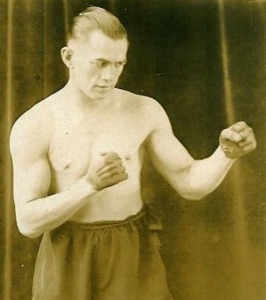


Johnny Tillman was born in Minneapolis before the turn of the twentieth century, long before television became commonplace and boxing was sustained on a different basis than was the case in the Forties and Fifties and beyond. Fight cards were frequent and boxers fought often, and Tillman was among those who did.
Fighters frequently fought one-hundred or more times during a career at the time, and Tillman ran into a few of them, including Benny Leonard, widely thought of as the best or certainly one of the top two or three lightweights in boxing history. Tillman, who fought as a welterweight, fought 66 conventional fights and another 94 decided by newspaper decision.
Leonard was the lightweight champion from 1917 to 1925 and Tillman fought him in 1920, losing on points in a non-title fight. Ring Magazine at one time ranked Leonard eighth among the top 80 fighters in the last 80 years. ESPN ranked him seventh among the top 50 boxers all time.
Tillman also fought Jock Malone of St., Paul, a Minnesota Hall of Fame fighter whose record was established in 125 professional fights and included a claim at one-time to the world title. Tillman won a newspaper decision over Malone, who was 28-4-3 at the time,
in a 10-round bout that took place in Minneapolis . He lost a newspaper decision to Malone in a sub- sequent fight. Malone was an athletic fighter with a brash tongue and was the number five ranked middleweight at one time.
Tillman also fought during a period when fighters frequently were identified by shortened, changed or, in some case, fabricated names, colorful and catching as they were. “Battling, young and kid’’ were frequently used as rst names, as in the case of Tillman opponents: Kid Kelly, Kid Spaghetti, Young Doherty, Young Jack O’Brien and Young Abe Brown.
Kid Spaghetti?
As one quipster noted, his parents should have considered changing his rst name to something more suitable.
There was also Couerd’ Alene Boyden, kayoed by Tillman in Utah. It is unclear if Couerd’ Alene was given as the fighter’s first name because he was part of the local indigenous community or if he simply borrowed the name of the place he lived.
Again, a comment from the boxing quipster who wondered: “Why would parents with a brain in their heads name their son Couerd’ Alene. The name in French translates to awl’s heart, and was apparently used by French traders to describe a leather tool used by the local Schitsu’umsh people.
Tillman also defeated another Minnesota Boxing of Hall of Fame inductee, Jimmy Potts, in a 1914 bout. Potts had 110 fights that included 75 wins and was known more so for the gym he ran in downtown Minneapolis – a place the entire fight community frequented, a sanctuary for local fighters during the 1940s and 1950s. Potts was inducted into the Minnesota Boxing Hall of Fame with the class of 2017.
Potts had so much long-term success with his gym that many ghters who frequented his location were of a different generation and unfamiliar with his success
in the ring. It was almost forgotten that he had been a successful fighter for some time himself, before opening his gym.
Tillman fought for eighteen years, from 1912 to 1930, winning his first four fights by knockout. He made his debut in Minneapolis in June of 1912 against Kid Kelly and knocked him out in two rounds.
Most fighters get a grace period at the start of their careers by facing opponents not apt to pose much of a challenge. It provides an opportunity for the newcomer, who often fights newcomers himself, to get his feet wet, so to speak, to build his confidence before taking on increasingly tougher opponents as he gains experience.
It was no different for Tillman. He won his first four fights by knockouts and put together a string of eighteen consecutive fights without a loss, a streak that included one draw. All of those bouts took place in Minnesota, primarily in Minneapolis, but he also took fights in St. Paul, Hibbing, Superior and Duluth.
His first loss, and a newspaper decision at that, came in Milwaukee against Len Rowlands in a 10-round bout. He rebounded with four consecutive wins, all in Wisconsin cities, until losing for the second time, again on a newspaper decision, to Leach Cross in Hudson.
Many of his early bouts took place at various cities in Wisconsin where boxing got an earlier start than in its immediate neighbor to the west. Still, that often meant travel by train or long road trips since the interstate highway system was still no more than a dreamlike consideration.
Many cities had a dearth of fighters despite supporting the sport, and often those available fought under a variety of names for a variety of reasons. Sometimes they were unqualified stand-ins without much of a chance, looking for extra income, in some cases their only income.
Then there were fighters, especially younger ones, who took an assumed name to avoid making family members aware of their sideline trade.
The multitudinous number of newspaper decisions at the time was also the result of underdeveloped boxing establishments in many cities, as well as several other circumstances.
Whatever the reason in Tillman’s case, he put together a resume that de nes him as an active, well-traveled boxer who could stay in the ght against top ranked boxers at the time, even defeating some of the best, or holding his own, as was the case with Malone and certainly Leonard.
He fought against fighters with colorful labels, as he did in a newspaper win over the Bitter Root Kid in 1916 in Missoula, Montana. Eighteen years later, he finished his career with a newspaper loss to Johnny O”Donnell, the “Celtic Shadow’’ from St. Paul, in a six-round bout in Minneapolis.
Tillman stayed busy during his career, fighting in an opponent’s hometown as often as his own, traveling to neighboring states and taking on hometown favorites. His established record was twenty-seven wins, twenty-two losses and seventeen draws, with ten knockouts.
Yet, including the bouts scored by visiting journalists from local newspapers, he fought 160 times, 650 rounds and stayed active and busy for nearly two decades.
He fought and defeated fighters already inductees in the Minnesota Boxing Hall of Fame, and demonstrated unequivocally that he belongs there too.

